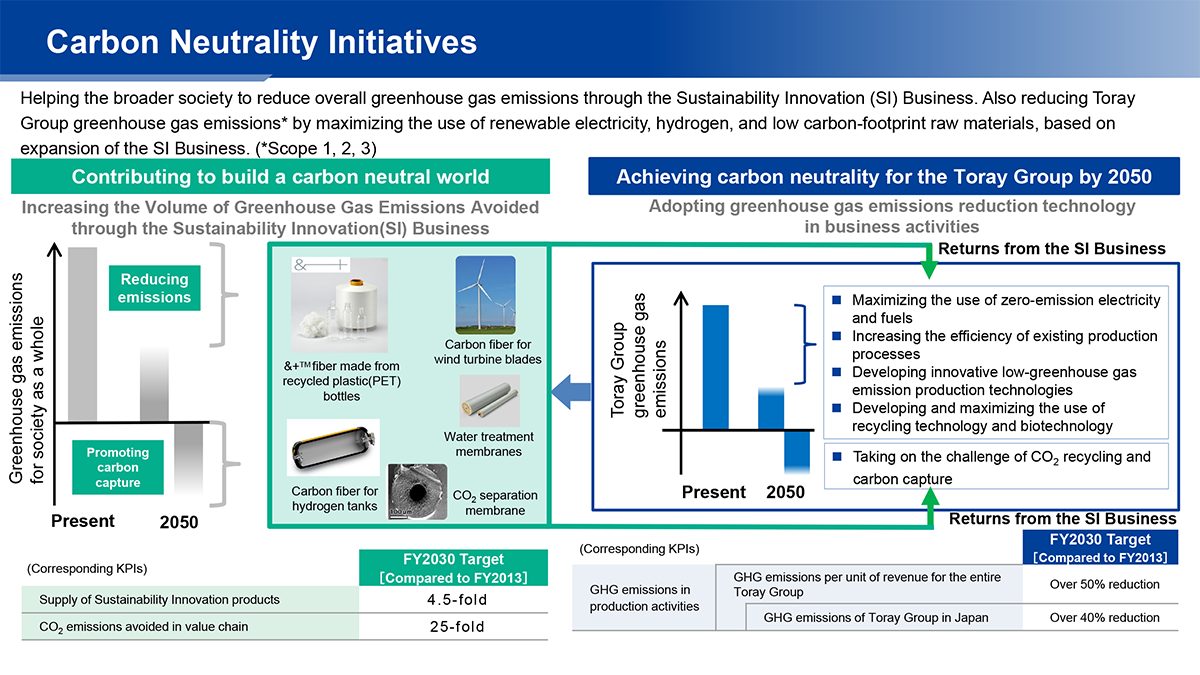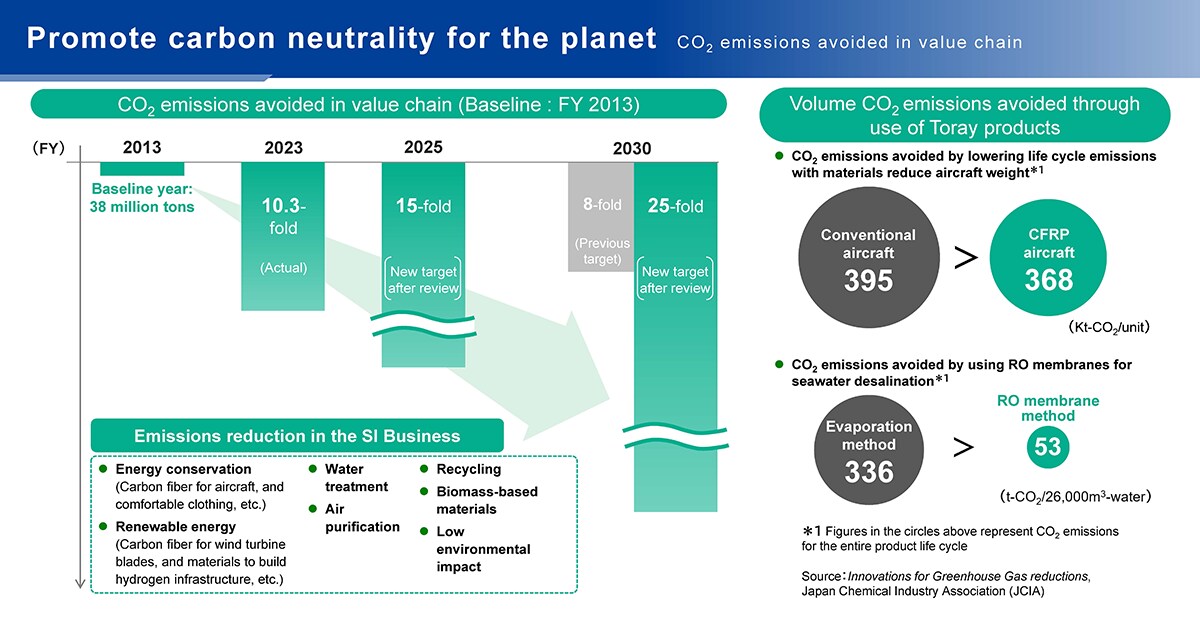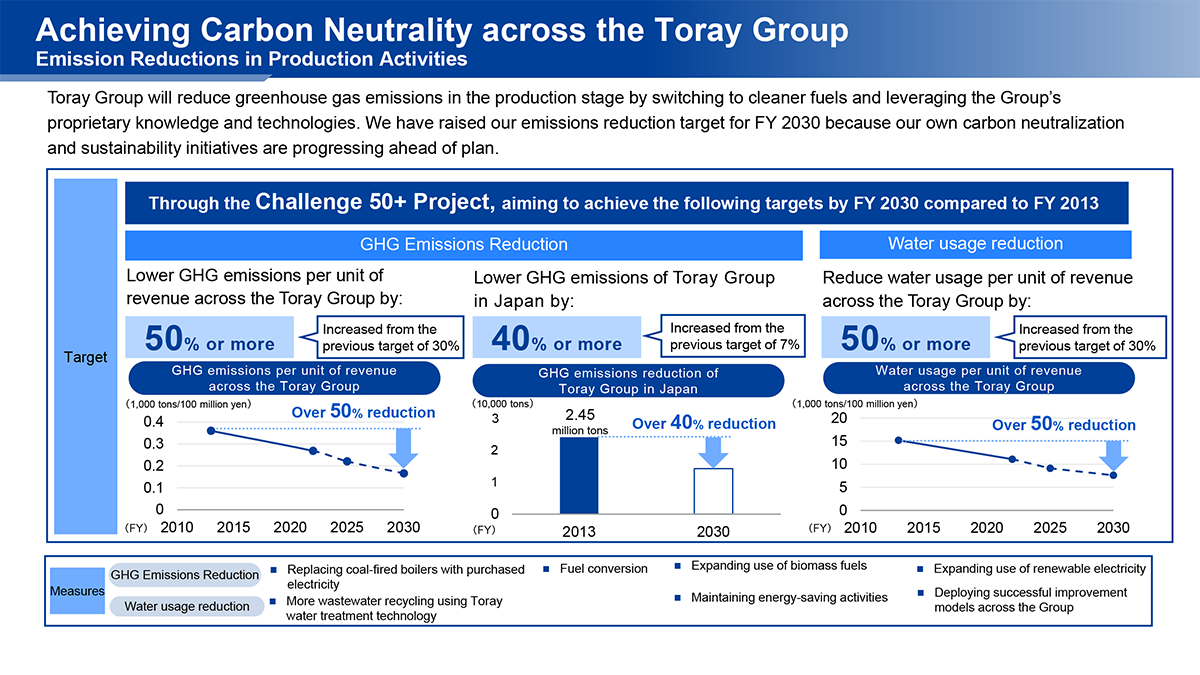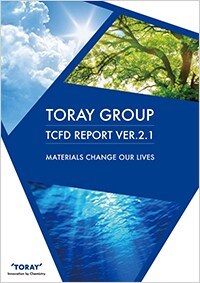- HOME
- Sustainability
- Toray Group’s Approach to Climate Change
Toray Group’s Approach to Climate Change
Toray Group is committed to its current corporate philosophy of “contributing to society through the creation of new value.” This is in keeping with a principle since Toray’s foundation in 1926 that corporations are public institutions that should contribute to society through business. Based on this corporate philosophy, Toray Group has for many decades focused on creating innovative technologies and advanced materials that provide solutions to various social challenges, including global environmental issues, and has helped to build a sustainable world.
Based on this approach, the Toray Group Sustainability Vision was established in 2018. As part of vision objectives to be achieved by 2050, the Group is aiming to help achieve a net zero emissions world, where greenhouse gas emissions are completely offset by absorption—in other words, a net zero emissions, carbon-neutral world.
The Group will help to reduce global greenhouse gas emissions and help to realize a carbon neutral world by 2050 by expanding the Sustainability Innovation (SI) Business1 that have long been a Toray focus, including renewable energy, hydrogen, and materials for electrification, and by developing products that help with greenhouse gas absorption, such as CO2 separation membranes.
In addition, Toray Group aims to reduce its own greenhouse gas emissions (Scope 1 and 2) and become carbon neutral by 2050. It will do this by expanding the Sustainability Innovation Business, which in return will provide Toray Group with sustainable energy and raw materials, as well as by developing and introducing innovative processes and CO2 recycling technology that utilize CO2 as a resource. Moreover, by promoting initiatives such as bio-based raw materials and recycling, the Group is also committed to promoting the reduction of Scope 3 emissions that will reduce greenhouse gas emissions throughout the entire supply chain.
- 1 Sustainability Innovation (SI) Business: Business areas and product lines that can help realize the Toray Group Sustainability Vision
To accelerate initiatives to address climate change, in April 2021 the Group established the Sustainability Committee, chaired by the president, as an organization that oversees measures to combat climate change, as well as the Climate Change Subcommittee.
In April 2022, the Circular Economy Subcommittee was added to further accelerate efforts to address climate change. In fiscal 2022, the Climate Change Subcommittee reviewed Toray Group's reduction targets for greenhouse gas emissions (Scope 1 and 2) to be achieved by fiscal 2030. The subcommittee also discussed a number of topics including the basic policy for ascertaining and reducing GHG emissions (Scope 3) throughout the supply chain, a digitalization promotion plan for calculating and visualizing product carbon footprints, and the 2023 internal carbon price (10,000 yen per ton of CO2) and how it should be used. Based on this, the Sustainability Committee deliberated and decided on the appropriate policies.
In addition, the Group partially revised its implementation system in 2023 and promotes initiatives by focusing on the following two projects: (1) the Sustainability Innovation Business Expansion Project (SI Business Expansion PJ below), which will contribute to reducing the GHG emissions of society in general through its business, and (2) the Climate Change Action Project (Climate Change Project below), which aims to reduce GHG emissions in its own business activities.
The SI Business Expansion PJ is primarily promoted by each of the business divisions. Meanwhile, subcommittees have been established separately in cross-business areas such as mobility, circular economy, and hydrogen, working together to expand the SI business.
The Climate Change Project promotes group-wide initiatives aimed at achieving the fiscal 2030 targets for Scope 1 and Scope 2 GHG emissions reductions as the Challenge 50+ Project. The project’s GHG Reduction Subcommittee (formerly the Climate Change Subcommittee) discusses overall strategy for making further reductions in GHG emissions, reductions in Scope 3 emissions, external communications, carbon pricing, and other topics.
Progress on these activities is regularly reported to the Board of Directors, which appropriately monitors the Group’s climate change prevention measures. The Board also considers opportunities and risks related to climate change as part of important factors when making business decisions and conducts appropriate oversight and comprehensive decision-making.
Further, in order to achieve carbon neutrality in 2050, Toray Group recognizes the need to make changes and take a leap in technological innovation based on non-conventional ideas, as well as the need for efforts that are not limited to single corporations, but involve industry, government, and broader society working together to achieve this goal. The Group holds discussions and pursues dialogue with affiliated economic organizations, industry associations, and government, working with these entities to achieve the goals of carbon neutrality and the Paris Agreement by 2050.
Through this dialogue, the Group collects information released by the government and conducts interviews with the relevant ministries. Toray shares its opinions and make recommendations as part of efforts to understand, confirm, and apply the relevant information to its internal policies.
Toray Group also participates in relevant industry organizations, which make recommendations to the government based on the consensus regarding initiatives needed to promote carbon neutrality.
Toray also participates in the GX League, a collaborative industry-government initiative to promote carbon neutrality. Accordingly, the Group discloses information related to its carbon neutrality activities, which includes the setting of GHG emission reduction targets and follow-up on the results achieved.
Major Affiliations: Organizations / Initiatives / Committees / Subcommittees (partial list)
- Nippon Keidanren (Japan Business Federation): Sub-Committee on Global Environment, Committee on Environment
- Japan Association of Corporate Executives: Environment and Energy Committee (Report in Japanese)
- Japan Chemical Industry Association: Technical Affairs Committee
- Japan Chemical Fibers Association
- Japan Environmental Management Association for Industry
- GX League
In order to reduce Category 1 emissions (from purchased goods and services), which account for the largest share of the Group’s Scope 3 emissions, Toray is promoting engagement with major suppliers in an effort to reduce the carbon footprint of purchased raw materials. This involves confirming their basic policies, reduction plans and targets, as well as relevant issues, while establishing constructive dialogues with the suppliers.



In May 2019, Toray Group declared its support for the Task Force on Climate-related Financial Disclosures (TCFD) recommendations. In April 2021, the Toray Group TCFD Report 2021 was released in accordance with these TCFD recommendations. Toray analyzed its opportunities and risks associated with climate change and disclosed the results. The analysis covered activities not only within the Group, but also across its supply chain and product life cycles, from upstream raw material procurement to downstream processing, product use, and disposal.
Subsequently, in November 2023, the Toray Group TCFD Report Ver. 2 was released. Toray Group TCFD Report Ver. 2 includes new quantitative analysis of major climate change-related risks around the 2040 timeframe, as well as information on efforts to combat climate change in business activities, engagement with external partners, and other matters.
Then, an updated version, the Toray Group TCFD Report Ver. 2.1 was released in June 2024.

Toray Group TCFD Report Ver.2.1 (2.60MB)

Toray Group will continue to accelerate its pursuit of sustainable growth for the Group and initiatives to address climate change, as well as actively disclose information in accordance with the TCFD recommendations.
Click here for the Group’s past TCFD Reports.
Related Information
- Toray Group Sustainability Vision
- Conserving Energy and Reducing Greenhouse Gas Emissions
- Risk Management
- Contributing Solutions to Social Issues through Business Activities
- Establishing Sustainable Supply Chain
Click here (3.11MB)PDF for Toray’s answers to the CDP 2024 questionnaire (available only in Japanese).
<Toray Group Efforts to Date>
One of the corporate commitments presented in Toray Group’s Long-Term Corporate Vision, AP-G 2000, introduced in 1991, was to play an active role in protecting the global environment, and in the same year, the Group established the Global Environment Research Laboratory. In the following year (1992), the management of Toray Group affirmed its determination to take active steps to address global environmental issues, one of which was the formation of the company-wide Global Environment Committee.
In 2000, Toray Group formulated its Three-Year Environmental Plan of medium-term environmental preservation goals, which included targets for reducing greenhouse gas emissions. The Group continued to pursue activities in line with this plan through its Fifth Medium-Term Environmental Plan (targets set for FY2020).
In 2009, Toray Group established its Global Environment Business Strategic Planning Department under the direct control of the president for the purpose of promoting and supporting company-wide plans, development, and business integration of Toray Group global environment business strategies. Since 2011, under the Group’s Long-Term Corporate Vision AP-Growth Toray 2020, this department has been central in efforts to expand the Group’s Green Innovation businesses and promote Toray products and services that provide solutions to global environmental challenges and issues related to resources and energy.
Moreover, in the face of the increasing severity of such global environmental challenges as climate change, in July 2018 Toray Group announced the Toray Group Sustainability Vision, which sets out Toray Group initiatives and quantitative targets for fiscal 2030 with a view to realizing the World as Envisioned by Toray Group in 2050. The Group has continued to focus on promoting efforts to achieve this vision. In May 2020, Toray Group announced its Long-Term Corporate Vision, TORAY VISION 2030-Achieving sound, sustainable growth and creating social value, which runs through the end of fiscal 2030. At the same time, the Group released its Medium-Term Management Program, Project AP-G 2022 “Resilience and Proactive Management”-Sustainable Growth and New Development, which covers the three-year period starting in fiscal 2020.
As part of this effort, the Group’s Green Innovation businesses, which help solve global environmental problems and resource- and energy-related issues, and its Life Innovation businesses, which contribute to better medical care and long, healthy lives and promote public health and human safety, including measures to counter disasters and abnormal weather, were integrated and redefined as the Sustainability Innovation (SI) Business. The Group is expanding the SI Business while strengthening its sustainability efforts, as shown by the integration of the Global Environment Business Strategic Planning Department into the Corporate Strategic Planning Division. By expanding the products supplied by the SI Business, Toray Group aims to promote Group growth and will contribute to the sustainable development of society through means such as greater CO2 emissions avoided in the value chain.
Moreover, based on its core values of contributing to society through its business activities, people-centric management, and management from a long-term perspective, Toray Group has established TORAY VISION 2030 with the aim of providing new value to society and focusing on the four perspectives of the world envisioned under the Toray Group Sustainability Vision. This will be achieved by sharing Toray's management strengths in R&D, sales & marketing, and production, and by pursuing co-creation with the customers and business partners that make up the supply chain, all with a materials-oriented approach.
<Progress on Project AP-G 2025 Sustainability Goals and on the Fiscal 2030 Goals of the Toray Group Sustainability Vision>
| FY 2023 Actual2 |
FY 2025 Target2 |
FY 2030 Target2 |
|
|---|---|---|---|
| Revenue from Sustainability Innovation (SI) Business | 1,311.5 billion yen (2.3-fold) |
1,600.0 billion yen (2.8-fold) |
4.5-fold |
| CO2 emissions avoided in value chain | 10.3-fold | 15.0-fold | 25-fold |
| Water filtration throughput contribution by Toray’s water treatment membranes | 2.7-fold | 2.9-fold | 3.5-fold |
| Greenhouse gas emissions per unit of revenue in production activities | 228 tons/100 million yen (36% reduction3) |
40% reduction | 50% or more reduction |
| Greenhouse gas emissions of Toray Group in Japan | 1.83 million tons (26% reduction3) |
20% reduction | 40% or more reduction |
| Water usage per unit of revenue in production activities | 9,500 tons/100 million yen (35% reduction3) |
40% reduction | 50% or more reduction |
- 2 Each relative ratio is calculated in comparison to FY 2013.
- 3 The calculation of the figure for the baseline of FY 2013 includes data for companies that joined the Toray Group in FY 2014 or later.
In 2022, Toray Group newly established the Environmental Solutions Department within the Corporate Marketing Planning Division for the purpose of promoting and supporting Group-wide plans, development, and business integration of Toray Group circular economy strategies.
<Cross-Industry Metrics from the 2021 TCFD Annex “Implementing the Recommendations of the Task Force on Climate-related Financial Disclosures”>
|
|
|---|---|
|
|
|
|
|
|
|
|
|
|
|
|